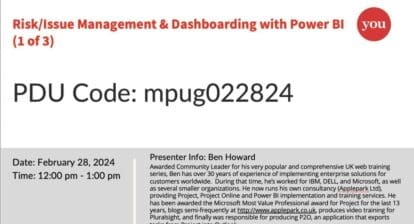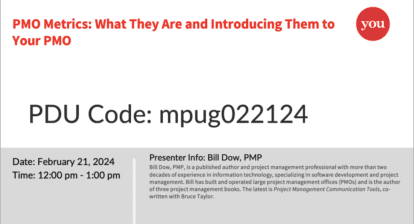 One of the biggest failures project managers experience when executing their projects stems from the lack of understanding of Organizational Change Management (OCM). Sadly, it’s true. When we see projects fail over and over, often we see problems in the same two areas:
One of the biggest failures project managers experience when executing their projects stems from the lack of understanding of Organizational Change Management (OCM). Sadly, it’s true. When we see projects fail over and over, often we see problems in the same two areas:
- Project communications
- Organizational Change Management (OCM)
Would you agree?
Let me ask you a couple of Yes/No questions to make the point.
- Is there a formal OCM lead on your project today?
- Does your company have a formal OCM framework?
- Do your executives or leadership ask you about the impact your project is having on the people who are touched by proposed changes?
- Do you include OCM in your status meetings?
- Does your development or project management methodologies have OCM built into them?
Ok. Now let’s score one point for every question you answered Yes to and zero points for every question for which you said No.
What’s your total? Use this scoring table below to rate your company’s OCM score.
What was your score? Do you have work to do, or did you knock it out of the park? I have some guesses about how your company scored, but don’t worry, this is just between you and me. I won’t tell anyone!
I know the quiz was just for fun, but your result should get you thinking about the importance of OCM and the role it plays on projects. Obviously, the lower the score, the worse off your company is at doing OCM. You have to do something about that, or you will continue to struggle on your projects.
How does one resolve?
Well, there is no easy answer this, but if I could give you any advice, I would say follow these tips:
- Understand the different Organizational Change Management models. You don’t have to master them all, but knowing at least one or two of them helps you get going in the right direction.
- Know the OCM frameworks and follow them. Don’t wing this. You are impacting people’s lives with these changes, and it’s something that you have to take very seriously.
- Focus on the people first, and the process second. This is so important! The only way that you are going to be successful is when you get adoption from the people impacted by the changes you propose.
- Know that people accept changes at different rates and some people take a lot longer than others. Understand, embrace, and work with that fact to help everyone through the change!
- Obtain executive support. Before beginning any project, you need executive support for the changes the project will have on the people. Without executive support, you are never going to be a success, so don’t even try until you have this in place!
What do you think?
I hope these tips help. As PMOs and Project Managers, if we work together and continue to push the importance of Organizational Change Management, I think it will go a long way to delivering successful projects!
I’d like to hear from you. Comment below or watch my on-demand webinar, Organizational Change Management: What is the role of the PMO Manager?








Sonya
In IT, it’s particularly attractive to let the people-factors go and only focus on the technical work. This happens when deadlines are aggressive and the customer is all internal, but it can happen on any project. It’s a mistake though. Customers who have high satisfaction scores at the end of the project or who can talk about what went well turn into real supporters of IT – and of you as a PM. Maybe they can be more flexible when something really rigid comes down the line in the future. They might request you for their work because they trust you the most. Or they can turn into adversarial and entrenched parties not willing to return your calls or provide resources to the work. It affects customer perception of IT value plus your individual reputation.
The org change work gets cut out in the name of meeting earlier deadlines and shaving work out of the schedule. Some feel org change not an IT problem to solve at all or the gains aren’t worth the effort. The business can sort it out on their own. This is not only short sighted, but false economy too.
The price for these choices is a much higher and expensive/ongoing support burden due to low adoption and problems, lost good will (deeper grudges), and the next project will have a much harder time gaining traction and being successful. I try to remember that we are all one re-org away from working for that internal customer who has been steamrolled over and over again.